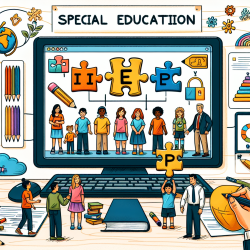The landscape of special education is evolving with the integration of technology, offering new avenues for delivering therapeutic services. Among these advancements, online therapy has emerged as a pivotal resource, providing an adaptable, efficient, and accessible option for students with special needs. This comprehensive guide aims to inform special education advocacy groups about the benefits and implementation of online therapy, ensuring that stakeholders are well-equipped to support students in achieving their Individualized Education Program (IEP) goals.
The Advantages of Online Therapy in Special Education
- Accessibility: Online therapy breaks down geographical barriers, making it possible for students in remote or underserved areas to receive the services they need.
- Flexibility: The nature of online therapy allows for scheduling that accommodates the diverse needs of students and schools, including after-hours sessions.
- Customization: Therapists can utilize a wide range of online tools and resources to tailor sessions to each student's unique needs, enhancing engagement and effectiveness.
- Consistency: Online therapy provides a consistent therapeutic environment, which is particularly beneficial for students who thrive on routine.
Implementing Online Therapy in Schools
Adopting online therapy in a school setting involves several key steps, including evaluating technological needs, ensuring compliance with legal and ethical standards, and training staff. It is crucial for schools to partner with reputable online therapy providers like TinyEYE, who can offer the expertise and support needed for a successful implementation.
Impact on IEP Goals
Online therapy directly supports the achievement of IEP goals by providing individualized, targeted interventions. Therapists can collaborate with special education teams to align therapy sessions with each student's objectives, tracking progress and making adjustments as needed. This integrated approach fosters a cohesive educational experience, promoting overall student success.
Case Studies: Success Stories of Online Therapy
Real-world examples highlight the transformative potential of online therapy. Students who previously had limited access to specialized services have made significant strides in communication, social skills, and academic performance. These success stories underscore the value of online therapy as a tool for empowering students with special needs.
Conclusion
Online therapy represents a significant advancement in special education, offering a flexible, accessible, and effective solution for meeting the diverse needs of students. As technology continues to evolve, it is imperative for special education advocacy groups to embrace these tools, ensuring that all students have the opportunity to reach their full potential. By fostering collaboration between schools, therapists, and families, we can create a more inclusive educational landscape that celebrates and supports the unique journey of every learner.
For special education advocacy groups seeking to champion the integration of online therapy into school programs, this guide serves as a starting point for understanding its benefits, implementation, and impact. Together, we can work towards a future where every student has access to the resources they need to succeed.










